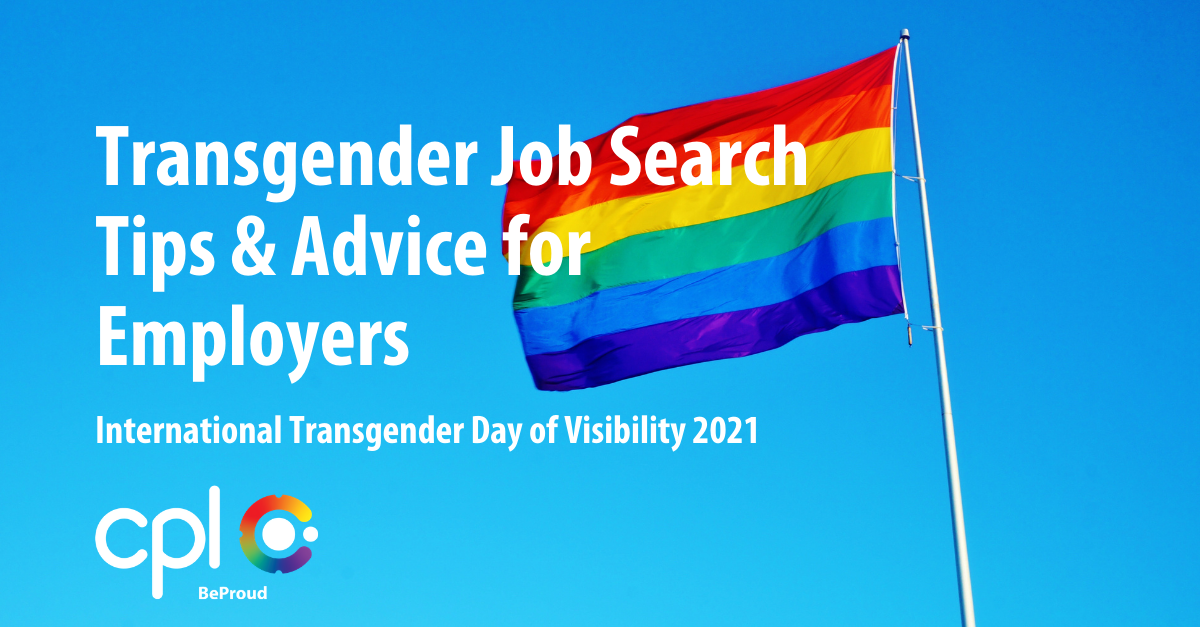Following on from our recent interview with the talented Luca Keating, creator of The Gender Code, we introduce the second part of our series promoting for International Transgender Day of Visibility.
As a candidate, going for an interview can be a nerve-wracking experience no matter who you are. You need to consider what to wear, what to say, what questions to ask, it can cause anxiety for the best of us.
Now add invasion of personal privacy, discrimination, LGBTQ+ bias and potential harassment to the equation and you’ll have a better idea of what it is like to face some of the job search challenge’s transgender applicants can encounter.
The interview experience for transgender job applicants
Speaking to a friend recently, trans and currently working for a multinational company, she shared a few of her experiences of what it was like to interview and I was appalled. The unfortunate reality is that these are current events and not behaviour anyone should be subjected to.
The first was a job interview with a large tech company. She had gone to the reception at the appropriate time to check in for her interview, was greeted politely by the receptionist and asked to take a seat and wait for the interviewer.
The potential employer came out to meet with her and simply said “no way am I dealing with this” and walked away, leaving the receptionist to apologise and say that they would have someone else come out to speak with her.
Shocking behaviour, but she did not say anything because she did not want to draw more attention.
In another incident of discrimination, a hiring manager stared out the window for 30 minutes refusing to make eye contact. Someone came into the room after the 30 minutes to see if everything was ok and the interviewer just said “so, we will get back to you if we need anything, thanks”. Again, she left feeling embarrassed and completely dismissed.
These are not isolated incidents and they're not widely spoken about due to the fact many transgender applicants feel vulnerable and don’t want to draw more attention to fight this discrimination. They have just accepted that this is the risk in applying and part of the process. Well, it is not.
Unfortunately, many hiring managers and interviewers don't have experience hiring candidates from the transgender community and often don't know how to proceed appropriately. Set the environment open and transparent and follow our tips below for both jobseekers and employers.
As a transgender job seeker, what can you do?
Research the company and ensure they are an inclusive employer.
Align your name across all legal documents.
Prepare standard interview questions like, tell me a little bit about yourself? Tell me about a time you dealt with a difficult situation? Tell me about a time that you got something wrong? Preparing strong answers to common competency-based questions will help to give you a firm foundation to feel more confident.
Be prepared to professionally correct misuse of pronouns, for example, “actually I use he/him pronouns”.
Know your rights - you should not be discriminated against. Although interviewing can be a stressful process in itself, transgender and non-binary candidates can experience sex-based discrimination which they are protected from.
Visit the Transgender Equality Network Ireland (TENI) website for resources available to support you.
As an inclusive hiring manager, what can you do?
Use the name/pronouns that the candidate provides, even if the name is different than those on official documents. It is totally ok to ask “what is your preferred pronoun?”
Don’t worry about saying the wrong thing. If you have open communication and come from a place of respect, the candidate will be understanding and together you can engage in an open dialogue.
Don’t make the candidate uncomfortable. Don’t stare out the window or avoid eye contact. Don’t behave in a manner that is awkward. Instead, treat the person like anyone else, make the candidate feel valued and welcome to discuss the skills that your saw on their application that brought them to the interview stage.
If you are unsure what to say, always go back to the candidate’s professional experience and skills. This is a formal evaluation. Ensure the candidate knows and feels that they are being assessed purely on their suitability for the role in question and nothing more.
Treat candidates the same, don’t ask questions that you wouldn’t normally ask any other candidates.
Don’t do without just because of doubt. Don’t use culture fit as a get-out clause to avoid hiring transgender candidates. If you feel that you are being biased at any point or doubt your own decision, get a trusted colleague’s second opinion or go to the Transgender Equality Network Ireland (TENI) website for more advice and resources.
Overall, for candidates and employers alike it is important to do some research. Know your company’s transgender and non-discrimination policies or if these are unavailable to you as a candidate check out the company’s inclusion information online.
Transgender visibility day is not just about being seen, it is about education, activism and allyship. This should be carried on throughout, 365 days.
Inclusion is in every action. Belonging is in every moment. Diversity is in making the right choices. Let us make the right choices and hire for a better future.
